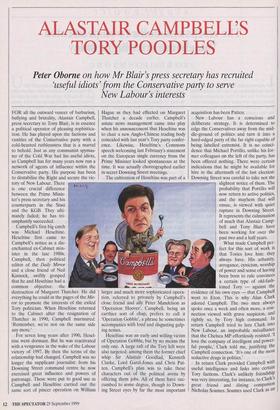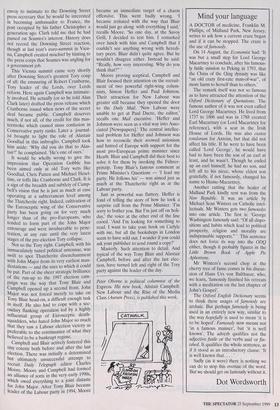ALASTAIR CAMPBELLS TORY POODLES
Peter Oborne on how Mr Blair's press secretary has recruited
`useful idiots' from the Conservative party to serve New Labour's interests
FOR all the outward veneer of barbarism, bullying and brutality, Alastair Campbell, press secretary to Tony Blair, is in essence a political operator of pleasing sophistica- tion. He has played upon the factions and vanities of the Conservative party with a cold-hearted ruthlessness that is a marvel to behold. Just as any communist spymas- ter of the Cold War had his useful idiots, so Campbell has for many years now run a network of agents of influence within the Conservative party. His purpose has been to destabilise the Right and secure the vic- tory of New Labour. There is one crucial difference between the Prime Minis- ter's press secretary and his counterparts in the Stasi and the KGB. They ulti- mately failed; he has tri- umphantly succeeded.
For seven long years after 1990, Hesel- tine went dormant. But he was reactivated with a vengeance in the wake of the Labour victory of 1997. By then the terms of the relationship had changed. Campbell was no longer the supplicant journalist: from his Downing Street command centre he now exercised great influence and powers of patronage. These were put to good use as Campbell and Heseltine carried out the same sort of pincer operation on William Hague as they had effected on Margaret Thatcher a decade earlier. Campbell's astute news management came into play when his announcement that Heseltine was to chair a new Anglo-Chinese trading body coincided with last year's Tory party confer- ence. Likewise, Heseltine's Commons speech welcoming last February's statement on the European single currency from the Prime Minister looked spontaneous at the time. It was actually choreographed earlier in secret Downing Street meetings.
The cultivation of Heseltine was part of a larger and much more sophisticated opera- tion, referred to privately by Campbell's close friend and ally Peter Mandelson as `Operation Hoover'. Campbell, being an earthier sort of chap, prefers to call it `Operation Gobble', a phrase he sometimes accompanies with loud and disgusting gulp- ing noises.
Heseltine was an early and willing victim of Operation Gobble, but by no means the only one. A large raft of the Tory left were also targeted: among them the former chief whip Sir Alastair Goodlad, Kenneth Clarke, Lord Garel-Jones and Chris Pat- ten. Campbell's plan was to take these characters out of the political arena by offering them jobs. All of them have suc- cumbed to some degree, though to Down- ing Street eyes by far the most important acquisition has been Patten.
New Labour has a conscious and deliberate strategy. It is determined to edge the Conservatives away from the mid- dle-ground of politics and turn it into a hard-edged party of the far right capable of being labelled extremist. It is no coinci- dence that Michael Portillo, unlike his for- mer colleagues on the left of the party, has been offered nothing. There were certain indications that he might be available for hire in the aftermath of the last election: Downing Street was careful to take not the slightest notice of them. The probability that Portillo will now return to active politics, and the mayhem that will ensue, is viewed with quiet rapture in Downing Street. It represents the culmination of much that Alastair Camp- bell and Tony Blair have been working for over the past two and a half years.
What made Campbell per- fect for this sort of work is that Tories love him: they always have. His urbanity, arrogance, cynicism, worship of power and sense of having been born to rule convinces a certain type of old-fash- ioned Tory — against the evidence of his own eyes — that Campbell went to Eton. This is why Alan Clark adored Campbell. The two men always spoke once a week and often more, a con- nection viewed with grave suspicion, and rightly so, by Tory high command. In return Campbell tried to lure Clark into New Labour, an improbable mesalliance that the Chelsea MP effortlessly resisted. love the company of intelligent and power- ful people,' Clark told me, justifying the Campbell connection. 'It's one of the most seductive drugs in politics.'
In return Clark provided Campbell with useful intelligence and links into certain Tory factions. Clark's unlikely friendship was very interesting, for instance, to Clark's great friend and dining companion Nicholas Soames. Soames used Clark as all envoy to intimate to the Downing Street press secretary that he would be interested in becoming ambassador to France, the post occupied by his father Christopher a generation ago. Clark told me that he had passed on Soames's interest,. History does not record the Downing Street reaction, though at last year's euro-summit in Vien- na, Campbell created mischief by hinting to the press corps that Soames was angling for a government job. This Vienna summit came very shortly after Downing Street's greatest Tory coup of all: the ensnaring of Robert Cranborne, Tory leader of the Lords, over Lords reform, Here again Campbell was intimate- ly involved. He actually (or so he told Alan Clark later) drafted the press release which Cranborne issued when news of the secret deal became public. Campbell deserves much, if not all, of the credit for this mas- terstroke which caused mass confusion in Conservative party ranks. Later a journal- ist brought to light the role of Alastair Goodlad in this imbroglio. Campbell took him aside: 'Why did you do that to Alas- tair?' he complained. 'He's one of ours.' It would be wholly wrong to give the impression that Operation Gobble has been aimed only at old Tory wets like Goodlad, Chris Patten and Michael Hesel- tine, or toffs like Cranborne and Clark. It is a sign of the breadth and subtlety of Camp- bell's vision that he is just as much at ease operating at a subterranean level among the Thatcherite right. Indeed, cultivation of the Eurosceptic wing of the Conservative party has been going on for very much longer than of the pro-Europeans, who tended to form part of the John Major entourage and were invulnerable to pene- tration, at any rate until the very latest stages of the pre-election Tory collapse. Not so the Tory right. Campbell, with his immaculately tuned political antennae, was swift to spot Thatcherite disenchantment with John Major from its very earliest man- ifestations — and the uses to which it could be put. Part of the sheer strategic brilliance of the run-up to the 1997 election cam- paign was the way that Tony Blair and Campbell opened up a second front. John Major was not forced merely to take on Tony Blair head-on, a difficult enough task in itself. He also had to cope with a sec- ondary flanking operation led by a highly influential group of Eurosceptic death- squadders, who hated John Major so much that they saw a Labour election victory as preferable to the continuance of what they believed to he a bankrupt regime. Campbell and Blair actively fostered this tiny coterie both before and after the last election. There was initially a determined but ultimately unsuccessful attempt to recruit Daily Telegraph editor Charles Moore. Moore and Campbell had formed an alliance of sorts in the very early 1990s, which owed everything to a joint distaste for John Major. After Tony Blair became leader of the Labour party in 1994, Moore became an immediate target of a charm offensive. This went badly wrong. 'I became irritated with the way that Blair would just go along with everything I said,' recalls Moore. `So one day, at the Savoy Grill, I decided to test him. I remarked over lunch with him and Campbell that I couldn't see anything wrong with heredi- tary peers. Blair didn't quite agree. But he wouldn't disagree either. Instead he said: "Really, how very interesting. Why do you think that?" ' Moore proving sceptical, Campbell and Blair focused their attention on the recruit- ment of two powerful right-wing colum- nists, Simon Heffer and Paul Johnson. Their attraction for New Labour was greater still because they opened the door to the Daily Mail. 'New Labour were unable to get at Paul Dacre, the editor,' recalls one Mail executive. 'Heifer and Johnson were seen as a vital way into Asso- ciated [Newspapers].' The central intellec- tual problem for Heffer and Johnson was how to reconcile their avowed unionism and hatred of Europe with support for the most pro-European prime minister since Heath. Blair and Campbell did their best to solve it for them by invoking the Fiihrer- prinzip. Tony Blair's famous comment at Prime Minister's Questions — 'I lead my party. He follows his' — was aimed just as much at the Thatcherite right as at the Labour party.
Just as powerful was flattery. Hefter is fond of telling the story of how he took a surprise call from the Prime Minister. I'm sorry to bother you. But I'm just off on holi- day,' the voice at the other end of the line cooed. 'And I'm looking for something to read. I want to take your book on Carlyle with me, but all the bookshops in London seem to have sold out. I wonder if you could ask your publisher to send round a copy?'
Masterly. Such attention to detail. And typical of the way Tony Blair and Alastair Campbell, before and after the last elec- tion, have turned left and right of the Tory party against the leader of the day.
Peter Oborne is political columnist of the Express. His new book, Alistair Campbell: New Labour and the Rise of the Media Class (Aw-um Press), is published this week



























































































 Previous page
Previous page